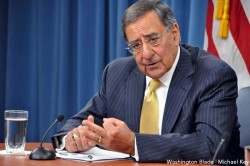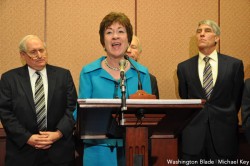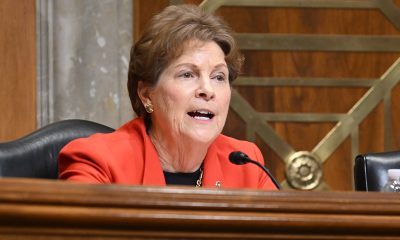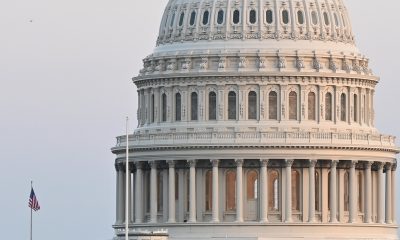National
Demise of ‘Don’t Ask’ celebrated, but questions linger
Pentagon, lawmakers herald end of military’s gay ban
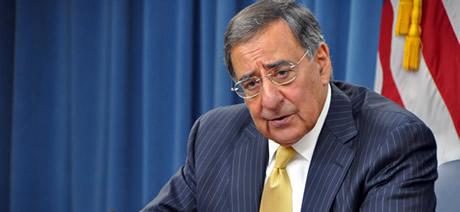
Top Pentagon leaders and lawmakers celebrated the end of “Don’t Ask, Don’t Tell” this week as questions about the impact of the law’s repeal persist for gay service members.
Defense Secretary Leon Panetta said during a news conference that the end of “Don’t Ask, Don’t Tell” is “an historic day for the Pentagon and for the nation.”
“As secretary of defense, I am committed to removing all of the barriers that would prevent Americans from serving their country and from rising to the highest level of responsibility that their talents and capabilities warrant,” Panetta said. “These are men and women who put their lives on the line in the defense of this country, and that’s what should matter the most.”
Panetta said more than 97 percent of the 2.3 million men and women in the armed forces have received education and training on handling open service. The training started after President Obama signed repeal legislation in December.
Chairman of the Joint Chiefs of Staff Adm. Mike Mullen, who was likely making his final appearance before the media in his role before stepping down from his position Oct. 1, recalled the testimony he gave before the Senate in February 2010 in favor of repeal.
“I believed then, and I still believe, that it was first and foremost a matter of integrity; that it was fundamentally against everything we stand for as an institution to force people to lie about who they are just to wear a uniform,” Mullen said. “We are better than that. We should be better than that.”
Hours earlier, U.S. senators who were among the 65 who voted for repeal held a separate news conference to commemorate the end of “Don’t Ask, Don’t Tell.” Sens. Joseph Lieberman (I-Conn.) and Susan Collins (R-Maine), the original co-sponsors of the repeal legislation, were joined by Senate Armed Services Committee Chair Carl Levin (D-Mich.), Mark Udall (D-Colo.), Chris Coons (D-Del.) and Kirsten Gillibrand (D-N.Y.).
Lieberman said the effort to repeal “Don’t Ask, Don’t Tell” in Congress was one of the most satisfying and thrilling experiences he’s had as a senator.
“In our time, I think the front line of the civil rights movement is to protect people in our country from discrimination based on sexual orientation — all the more so when it comes to the United States military, whose mission is to protect our security so we can continue to enjoy the freedom and equal opportunity under law,” Lieberman said.
Collins read aloud a postcard she received in July after her committee vote in favor of “Don’t Ask, Don’t Tell” repeal from someone in Afghanistan who signed the note anonymously as “an Army soldier.” The postcard thanks Collins for her vote as a Republican and pledges to repay the vote “with continued professionalism.”
“This touches me so much for two reasons,” Collins said. “One, that this Army soldier deployed in Afghanistan took the time to write to thank me for my leadership. But second, it is so poignant that he couldn’t sign his name. He had to write, ‘an Army soldier,’ and today he can sign his name, and that makes all the difference.”
Amid the celebrations over the end of “Don’t Ask, Don’t Tell” at these news conferences, questions emerged about how to extend greater benefits to LGBT service members.
Only half the senators at the news conference — Udall, Gillibrand and Coons — are co-sponsors of legislation that would repeal the Defense of Marriage Act, which prohibits same-sex marriage. Collins, Lieberman and Levin aren’t co-sponsors of the legislation known as the Respect for Marriage Act.
Collins left the news conference at the start of the question-and-answer period. In response to a question from the Washington Blade, Levin affirmed his support for the Respect for Marriage Act, while Lieberman offered qualified support.
The Connecticut senator said he had issues with the “full faith and credit” portion of the Respect for Marriage Act enabling federal benefits to flow to married gay couples even if they live in a state that doesn’t recognize same-sex marriage.
“I do support it in part — I think we’ve got to celebrate what we’ve done today — I certainly support it in regard to discrimination in federal law based on sexual orientation,” Lieberman said.
During the Pentagon news conference, one reporter asked about possible guards against troops opposed to open service attempting to undermine it by committing acts of harassment or violence against gays.
Panetta said the military has “zero tolerance” for harassment and the command structure in place should address any such behavior.
“My hope is that the command structure operating with … the standard disciplines that are in place will implement those disciplines and will ensure that harassment doesn’t take place and that all behavior is consistent with the discipline and the best interests of our military,” Panetta said.
Some advocates have said the chain of command doesn’t provide sufficient protection against discrimination for gay service members — particularly if the discrimination is coming from a commanding officer — and have called on Obama to sign an executive order barring discrimination in the armed forces on the basis of sexual orientation and gender identity.
Another lingering question is whether military chaplains can officiate at same-sex weddings and if base facilities can be used for such ceremonies in states where same-sex marriage is legal.
A Navy memo dated April 13 affirmed that chaplains could officiate at same-sex weddings and base facilities could be used for this purpose, but this guidance was rescinded after an outcry from social conservatives. Guidance on the matter has yet to be reissued.
Following the Pentagon news conference, Defense Department General Counsel Jeh Johnson took questions from the media, and, in response to a question from the Blade, said such guidance clarifying the rules is forthcoming.
“We are very, very close to having a resolution of that issue,” Johnson said. “It’s something I’ve been working on myself. … We’re pretty much done and there should be something issued to the chaplain community and others very, very soon on that.”
U.S. Supreme Court
Supreme Court to consider bans on trans athletes in school sports
27 states have passed laws limiting participation in athletics programs

The U.S. Supreme Court on Thursday agreed to hear two cases involving transgender youth challenging bans prohibiting them from participating in school sports.
In Little v. Hecox, plaintiffs represented by the ACLU, Legal Voice, and the law firm Cooley are challenging Idaho’s 2020 ban, which requires sex testing to adjudicate questions of an athlete’s eligibility.
The 9th U.S. Circuit Court of Appeals described the process in a 2023 decision halting the policy’s enforcement pending an outcome in the litigation. The “sex dispute verification process, whereby any individual can ‘dispute’ the sex of any female student athlete in the state of Idaho,” the court wrote, would “require her to undergo intrusive medical procedures to verify her sex, including gynecological exams.”
In West Virginia v. B.P.J., Lambda Legal, the ACLU, the ACLU of West Virginia, and Cooley are representing a trans middle school student challenging the Mountain State’s 2021 ban on trans athletes.
The plaintiff was participating in cross country when the law was passed, taking puberty blockers that would have significantly reduced the chances that she could have a physiological advantage over cisgender peers.
“Like any other educational program, school athletic programs should be accessible for everyone regardless of their sex or transgender status,” said Joshua Block, senior counsel for the ACLU’s LGBTQ and HIV Project. “Trans kids play sports for the same reasons their peers do — to learn perseverance, dedication, teamwork, and to simply have fun with their friends,” Block said.
He added, “Categorically excluding kids from school sports just because they are transgender will only make our schools less safe and more hurtful places for all youth. We believe the lower courts were right to block these discriminatory laws, and we will continue to defend the freedom of all kids to play.”
“Our client just wants to play sports with her friends and peers,” said Lambda Legal Senior Counsel Tara Borelli. “Everyone understands the value of participating in team athletics, for fitness, leadership, socialization, and myriad other benefits.”
Borelli continued, “The U.S. Court of Appeals for the Fourth Circuit last April issued a thoughtful and thorough ruling allowing B.P.J. to continue participating in track events. That well-reasoned decision should stand the test of time, and we stand ready to defend it.”
Shortly after taking control of both legislative chambers, Republican members of Congress tried — unsuccessfully — to pass a national ban like those now enforced in 27 states since 2020.
Federal Government
UPenn erases Lia Thomas’s records as part of settlement with White House
University agreed to ban trans women from women’s sports teams

In a settlement with the Trump-Vance administration announced on Tuesday, the University of Pennsylvania will ban transgender athletes from competing and erase swimming records set by transgender former student Lia Thomas.
The U.S. Department of Education’s Office for Civil Rights found the university in violation of Title IX, the federal rights law barring sex based discrimination in educational institutions, by “permitting males to compete in women’s intercollegiate athletics and to occupy women-only intimate facilities.”
The statement issued by University of Pennsylvania President J. Larry Jameson highlighted how the law’s interpretation was changed substantially under President Donald Trump’s second term.
“The Department of Education OCR investigated the participation of one transgender athlete on the women’s swimming team three years ago, during the 2021-2022 swim season,” he wrote. “At that time, Penn was in compliance with NCAA eligibility rules and Title IX as then interpreted.”
Jameson continued, “Penn has always followed — and continues to follow — Title IX and the applicable policy of the NCAA regarding transgender athletes. NCAA eligibility rules changed in February 2025 with Executive Orders 14168 and 14201 and Penn will continue to adhere to these new rules.”
Writing that “we acknowledge that some student-athletes were disadvantaged by these rules” in place while Thomas was allowed to compete, the university president added, “We recognize this and will apologize to those who experienced a competitive disadvantage or experienced anxiety because of the policies in effect at the time.”
“Today’s resolution agreement with UPenn is yet another example of the Trump effect in action,” Education Secretary Linda McMahon said in a statement. “Thanks to the leadership of President Trump, UPenn has agreed both to apologize for its past Title IX violations and to ensure that women’s sports are protected at the university for future generations of female athletes.”
Under former President Joe Biden, the department’s Office of Civil Rights sought to protect against anti-LGBTQ discrimination in education, bringing investigations and enforcement actions in cases where school officials might, for example, require trans students to use restrooms and facilities consistent with their birth sex or fail to respond to peer harassment over their gender identity.
Much of the legal reasoning behind the Biden-Harris administration’s positions extended from the 2020 U.S. Supreme Court case Bostock v. Clayton County, which found that sex-based discrimination includes that which is based on sexual orientation or gender identity under Title VII rules covering employment practices.
The Trump-Vance administration last week put the state of California on notice that its trans athlete policies were, or once were, in violation of Title IX, which comes amid the ongoing battle with Maine over the same issue.
New York
Two teens shot steps from Stonewall Inn after NYC Pride parade
One of the victims remains in critical condition

On Sunday night, following the annual NYC Pride March, two girls were shot in Sheridan Square, feet away from the historic Stonewall Inn.
According to an NYPD report, the two girls, aged 16 and 17, were shot around 10:15 p.m. as Pride festivities began to wind down. The 16-year-old was struck in the head and, according to police sources, is said to be in critical condition, while the 17-year-old was said to be in stable condition.
The Washington Blade confirmed with the NYPD the details from the police reports and learned no arrests had been made as of noon Monday.
The shooting took place in the Greenwich Village neighborhood of Manhattan, mere feet away from the most famous gay bar in the city — if not the world — the Stonewall Inn. Earlier that day, hundreds of thousands of people marched down Christopher Street to celebrate 55 years of LGBTQ people standing up for their rights.
In June 1969, after police raided the Stonewall Inn, members of the LGBTQ community pushed back, sparking what became known as the Stonewall riots. Over the course of two days, LGBTQ New Yorkers protested the discriminatory policing of queer spaces across the city and mobilized to speak out — and throw bottles if need be — at officers attempting to suppress their existence.
The following year, LGBTQ people returned to the Stonewall Inn and marched through the same streets where queer New Yorkers had been arrested, marking the first “Gay Pride March” in history and declaring that LGBTQ people were not going anywhere.
New York State Assemblywoman Deborah Glick, whose district includes Greenwich Village, took to social media to comment on the shooting.
“After decades of peaceful Pride celebrations — this year gun fire and two people shot near the Stonewall Inn is a reminder that gun violence is everywhere,” the lesbian lawmaker said on X. “Guns are a problem despite the NRA BS.”
-

 U.S. Supreme Court2 days ago
U.S. Supreme Court2 days agoSupreme Court to consider bans on trans athletes in school sports
-

 Out & About2 days ago
Out & About2 days agoCelebrate the Fourth of July the gay way!
-

 Maryland5 days ago
Maryland5 days agoSilver Spring holds annual Pride In The Plaza
-

 Opinions5 days ago
Opinions5 days agoSupreme Court decision on opt outs for LGBTQ books in classrooms will likely accelerate censorship

